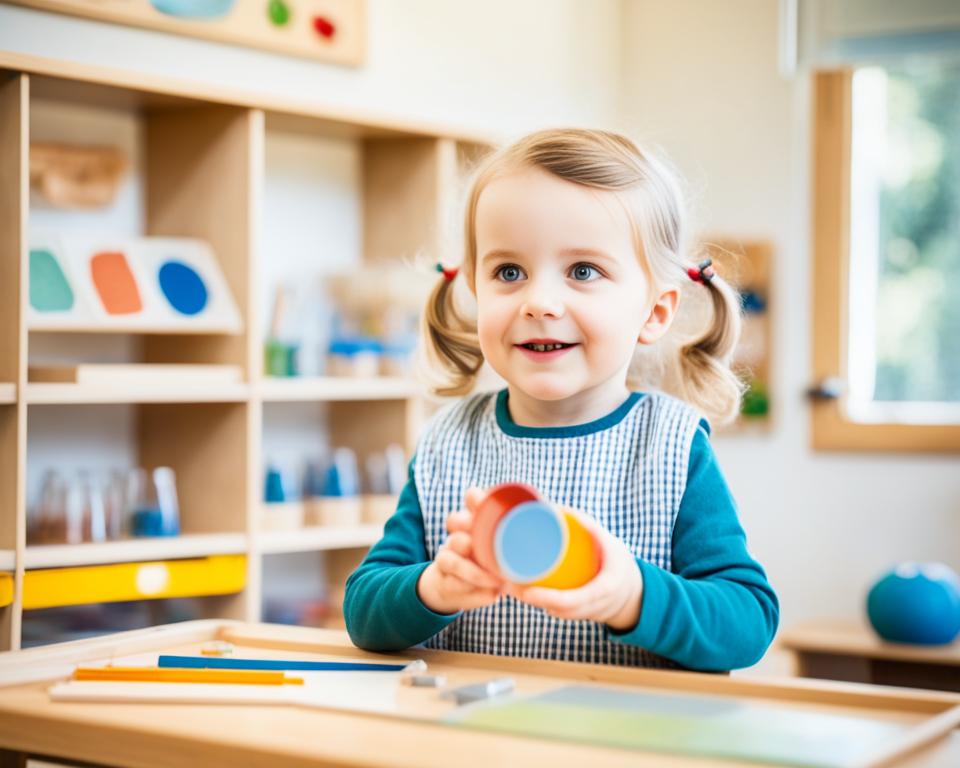- 1. Understanding Emotional Intelligence in Children
- 2. Early Childhood Learning: Emotional Intelligence and Sensory Processing
- 3. Signs of Challenges with Emotional Intelligence
- 4. Tips and Tricks for Improving Emotional Intelligence
- 5. The Montessori Perspective on Emotional Intelligence
- 6. Montessori-Based Strategies for Building Self-Awareness
- 7. Encouraging Empathy and Compassion Through Montessori Education
- 8. Montessori-Inspired Approaches to Social Problem-Solving and Conflict Resolution
- 9. Promoting Emotional Intelligence at Home: Montessori Tips for Parents and Caregivers
- 10. Conclusion
- 11. FAQ
- 11.1 What is the importance of emotional intelligence in early childhood development?
- 11.2 How does emotional intelligence impact a child’s overall well-being and success?
- 11.3 What are the key components of emotional intelligence in children?
- 11.4 How are sensory processing and emotional intelligence connected?
- 11.5 What challenges do children with low emotional intelligence face?
- 11.6 What strategies can be used to improve emotional intelligence in children?
- 11.7 How does the Montessori approach support the development of emotional intelligence?
- 11.8 What Montessori-based strategies can parents and caregivers use to nurture emotional intelligence at home?
- 12. Source Links
As a professional copywriting journalist, I am excited to explore the pivotal role of emotional intelligence in early childhood development. Research shows that the first five years of a child’s life are transformative for their social-emotional development. Developing emotional intelligence is crucial for children as it helps them recognize, understand, and manage their own emotions, as well as the emotions of others. Children with higher levels of emotional intelligence have better communication skills, conflict resolution abilities, and resilience in coping with stress and change.
Social-emotional development is vital for children’s overall well-being and success. Emotional intelligence allows children to navigate social interactions and build positive relationships. Children with higher emotional intelligence have better communication and conflict resolution skills. Emotional intelligence helps children cope with stress and change more effectively. Investing in social-emotional development lays the foundation for resilient and emotionally intelligent individuals.
Key Takeaways
- The first five years of a child’s life are crucial for social-emotional development.
- Developing emotional intelligence helps children recognize, understand, and manage their own and others’ emotions.
- Children with higher emotional intelligence have better communication, conflict resolution, and resilience skills.
- Social-emotional development is vital for children’s overall well-being and success.
- Investing in social-emotional development lays the foundation for resilient and emotionally intelligent individuals.
Understanding Emotional Intelligence in Children
Emotional intelligence plays a crucial role in a child’s social and emotional development. It encompasses a range of skills that enable children to recognize, understand, and manage their own emotions, as well as empathize with others. Developing emotional intelligence in early childhood lays the foundation for children to build strong relationships, communicate effectively, and navigate life’s challenges with resilience.
Expressing Emotions Appropriately
Helping children express their emotions in a constructive manner is a key aspect of fostering emotional intelligence. By teaching children how to identify and verbalize their feelings, we empower them to communicate their needs, build self-awareness, and develop healthy coping strategies.
Emotion Regulation
Effective emotion regulation involves equipping children with techniques to manage their emotions, such as deep breathing exercises or counting to ten when feeling angry or overwhelmed. Developing these self-regulation skills enables children to respond to situations with poise and resilience, rather than resorting to impulsive or disruptive behaviors.
Fostering Empathy
Empathy, the ability to understand and share the emotions of others, is a critical component of emotional intelligence. By encouraging children to consider perspectives beyond their own, we cultivate kindness, compassion, and a sense of community, essential for building positive relationships and navigating social interactions.
Promoting Self-Awareness
Developing self-awareness helps children gain a deeper understanding of their own emotions, strengths, and areas for growth. This self-knowledge empowers children to make informed decisions, regulate their behavior, and cultivate a positive sense of self, setting the stage for their overall well-being and success.
Early Childhood Learning: Emotional Intelligence and Sensory Processing
Sensory processing and emotional intelligence are closely intertwined. Interoception, the ability to sense and interpret signals from the body, plays an important role in emotional intelligence. Interoception allows us to accurately identify our feelings and triggers as they arise, enabling us to better manage our emotions and behavior. With a better understanding of our internal cues, we can learn how to regulate ourselves better, such as by practicing deep breathing exercises or engaging in mindful meditation during moments of stress or anxiety.
Interoception
Interoception, the sixth sense often overlooked in early childhood education, is a critical component of emotional intelligence and self-awareness. By tuning in to the body’s internal signals, children can develop a stronger connection between their physical sensations and emotional experiences. This awareness empowers them to self-regulate more effectively, fostering healthy social-emotional skills that set the stage for lifelong success.

Signs of Challenges with Emotional Intelligence
Children who struggle with emotional intelligence often face unique difficulties. They may find it arduous to regulate their emotions, leading to impulsive behavior or emotional outbursts. These children may also struggle to recognize and respond to the emotions of others, hindering their ability to form meaningful relationships.
Additionally, they may have trouble understanding abstract concepts like empathy and perspective-taking, which can further exacerbate problems in social settings. Lacking confidence in their capacity to manage their feelings or take responsibility for their actions, these children may find navigating school environments that require emotional regulation particularly challenging.
Sadly, children with emotional intelligence deficits are also more prone to experiencing anxiety or depression, as they often lack the necessary skills to properly process and manage their emotions. Research has even uncovered a connection between Autism Spectrum Disorder (ASD) and difficulties with emotional regulation.
| Challenge | Description |
|---|---|
| Emotional Regulation | Difficulty controlling and managing emotions, leading to impulsive behaviors and outbursts. |
| Social Interaction | Inability to recognize and respond appropriately to the emotions of others, hindering relationship formation. |
| Empathy and Perspective-Taking | Difficulty understanding abstract emotional concepts, contributing to problems in social settings. |
| Emotional Confidence | Lack of self-assurance in managing feelings and taking responsibility for actions. |
| Anxiety and Depression | Increased susceptibility to mental health challenges due to inability to process and regulate emotions effectively. |
| Autism Spectrum Disorder | Research indicates a connection between ASD and difficulties with emotional regulation. |
Tips and Tricks for Improving Emotional Intelligence
Nurturing emotional intelligence in children requires a multifaceted approach. By implementing various strategies, parents, caregivers, and educators can help young learners develop the skills to recognize, understand, and manage their emotions effectively.
Identifying Emotions
Empowering children to identify and label their emotions is a crucial first step. Through engaging conversations, role-playing exercises, and observing behavioral cues, we can guide children to recognize a range of emotions in themselves and others. This foundational awareness lays the groundwork for emotional regulation and effective communication.
Modeling Strategies and Empathy
As role models, we can demonstrate effective emotion regulation techniques, such as deep breathing or counting to ten when feeling overwhelmed. By showing empathy and validating children’s emotional experiences, we foster their understanding of others’ perspectives and build a supportive environment for emotional growth.
Open Conversations Around Emotions
Encouraging open and honest dialogue about emotions is essential. Communicating that all feelings are valid, and discussing healthy ways to manage them, helps children develop emotional intelligence. These conversations provide a safe space for children to express themselves and learn constructive coping strategies.
Personalized Sensory Diet
Incorporating a personalized sensory diet can significantly support a child’s ability to identify and regulate their emotions. Providing a variety of sensory inputs, such as calming music, tactile exploration, or movement activities, can help children feel grounded and better equipped to navigate their emotional experiences.
Consistent Boundaries
Establishing clear expectations and consequences when strong emotions arise helps children learn appropriate ways to respond. Consistent, caring boundaries provide a framework for emotional self-regulation, enabling children to develop the skills to manage their feelings in a constructive manner.
| Strategy | Benefits |
|---|---|
| Identifying Emotions | Develops emotional awareness and communication skills |
| Modeling Strategies and Empathy | Fosters emotional regulation and compassionate understanding |
| Open Conversations Around Emotions | Provides a supportive environment for emotional expression and growth |
| Personalized Sensory Diet | Helps children feel calm and grounded, supporting emotional regulation |
| Consistent Boundaries | Teaches appropriate emotional responses and self-regulation skills |

The Montessori Perspective on Emotional Intelligence
Montessori education places great emphasis on the development of the whole child, including physical, mental, emotional, and social aspects. Emotional intelligence is a key element of this holistic approach, as Montessori promotes the cultivation of skills such as empathy, self-awareness, adaptability, and social problem-solving. By encouraging the development of emotional intelligence, Montessori education provides a secure foundation for children to achieve success and well-being in all areas of their lives.
The Montessori method recognizes that social-emotional skills are just as crucial as cognitive development for a child’s overall growth and success. Through intentional activities and a carefully prepared environment, Montessori educators nurture children’s ability to recognize, understand, and manage their emotions, as well as develop empathy and social problem-solving abilities.
At the core of the Montessori approach is the belief that emotional intelligence is a key component of a child’s holistic development. By fostering self-awareness, emotional regulation, and social-emotional skills, Montessori education empowers children to become resilient, adaptable, and socially competent individuals, well-equipped to navigate the challenges of life.
| Montessori Approach | Emphasis on Emotional Intelligence |
|---|---|
| Holistic Development | Recognizing the vital role of emotional, social, and cognitive growth for children’s overall success and well-being. |
| Self-Awareness | Fostering children’s ability to understand their own emotions, strengths, and areas for growth. |
| Empathy | Cultivating children’s capacity to understand and share the feelings of others, promoting kindness and compassion. |
| Social Problem-Solving | Developing children’s skills in navigating interpersonal challenges and resolving conflicts effectively. |
| Adaptability | Equipping children with the emotional intelligence to cope with stress and change, building resilience. |
Montessori-Based Strategies for Building Self-Awareness
Montessori education promotes the development of self-awareness through various strategies. The prepared environment of the Montessori classroom offers a calm, orderly space for children to develop self-regulation and self-reflection skills, fostering a sense of personal responsibility and awareness.
Independence and Choice
By providing opportunities for independent work and decision-making, Montessori empowers children to understand their emotions, develop self-confidence, and become increasingly self-reliant. This focus on independence and personal choice allows children to explore their internal experiences and cultivate a stronger self-awareness.
Mindfulness Activities
Montessori educators also engage children in mindfulness practices, such as deep breathing exercises and relaxation techniques, to help them develop self-awareness and self-regulation skills. These activities encourage children to tune into their physical sensations, emotions, and thought processes, fostering a deeper understanding of their inner experiences.

Encouraging Empathy and Compassion Through Montessori Education
Montessori education places a strong emphasis on cultivating empathy and compassion in young children. As Montessori educators, we understand the vital role these social-emotional skills play in shaping a child’s development and their ability to navigate the world around them.
Modeling Compassion and Respect
At the heart of the Montessori approach is the principle of treating each child with the utmost respect and compassion. Montessori educators strive to model these behaviors, demonstrating how to respond to others’ emotions with empathy and kindness. By setting a positive example, we inspire children to emulate these compassionate traits in their own interactions.
Mixed-Age Classrooms
The Montessori mixed-age classroom environment fosters opportunities for older children to develop a sense of responsibility and empathy towards their younger peers. As they assist and guide the younger children, the older students gain a deeper understanding of others’ perspectives and emotions, nurturing their own emotional intelligence.
Peace Education
Montessori education also promotes peace and conflict resolution skills through various activities and lessons. Children are encouraged to explore different cultures, perspectives, and emotions, cultivating a greater understanding and appreciation for diversity. By engaging in role-playing, cooperative problem-solving, and grace and courtesy exercises, children learn effective communication and conflict resolution strategies, further enhancing their empathy and compassion.
Montessori-Inspired Approaches to Social Problem-Solving and Conflict Resolution
At the heart of Montessori education lies a deep commitment to developing children’s social-emotional intelligence, including their abilities to effectively navigate challenging social situations and resolve conflicts. This holistic approach empowers young learners with a range of strategies rooted in the Montessori philosophy.
Grace and Courtesy Lessons
Montessori classrooms prioritize explicit instruction in social etiquette, communication, and conflict resolution through dedicated “grace and courtesy” lessons. These lessons provide children with the tools to interact with their peers respectfully, express their needs and feelings constructively, and find peaceful solutions to interpersonal challenges. By mastering these essential social skills, children become better equipped to navigate the complexities of peer relationships and resolve conflicts effectively.
Peer Collaboration
Montessori education fosters a collaborative learning environment, where children work together to solve problems and complete tasks. These collaborative activities cultivate children’s ability to communicate clearly, listen attentively, and compromise when necessary. As children navigate the give-and-take of group work, they develop conflict resolution skills, learning to express their ideas, consider different perspectives, and find mutually agreeable solutions.
Role-Playing Activities
Montessori educators often incorporate role-playing exercises into their curriculum, allowing children to practice empathy, perspective-taking, and effective communication. Through these interactive activities, children can explore different social scenarios, experiment with various responses, and gain a deeper understanding of how their actions and emotions impact others. This experiential learning helps children develop the social problem-solving and conflict resolution skills that are essential for successful peer interactions and healthy relationships.

Promoting Emotional Intelligence at Home: Montessori Tips for Parents and Caregivers
As parents and caregivers, we play a crucial role in fostering emotional intelligence in young children. By incorporating Montessori principles into our homes, we can support the development of essential social-emotional skills that will serve children well throughout their lives.
Responsive Parenting
Responsive parenting involves attentively listening to a child’s emotions and providing age-appropriate strategies to help them navigate their feelings. This promotes open communication and a deeper understanding of emotional experiences, laying the foundation for emotional intelligence. When children feel heard and validated, they are more likely to develop self-awareness and the ability to regulate their own emotions.
Emotional Vocabulary
Encouraging the use of emotional vocabulary helps children express their feelings using words rather than solely through behaviors. By introducing a wide range of emotion-related words, such as “happy,” “sad,” “frustrated,” and “calm,” we empower children to articulate their internal experiences. This, in turn, supports their ability to identify and manage their emotions effectively.
Empathetic Role-Modeling
As parents and caregivers, we have the opportunity to model empathetic behavior for our children. By demonstrating compassion, understanding, and the ability to consider others’ perspectives, we show children the importance of empathy in building strong relationships and resolving conflicts. This empathetic role-modeling encourages children to develop these essential social-emotional skills.
Peaceful Problem Resolution
When faced with conflicts or challenges, we can guide children through the process of peaceful problem resolution. By facilitating collaborative family discussions and encouraging respectful communication, we help children develop conflict resolution and problem-solving abilities. This approach nurtures their emotional intelligence, enabling them to navigate social situations with greater ease and find constructive solutions.
By embracing Montessori-inspired strategies at home, we can create an environment that promotes the development of emotional intelligence in our children. This strong foundation will empower them to build resilient relationships, manage their emotions, and thrive in the years to come.
Conclusion
Fostering emotional intelligence in young children is an essential aspect of Montessori education, empowering them for effective communication, relationship-building, and self-awareness. By implementing Montessori-based strategies in the classroom and at home, parents, caregivers, and educators can support children’s emotional growth and cultivate resilience, empathy, and adaptability throughout their lives.
Embracing the Montessori approach to nurturing emotional intelligence helps children navigate life’s challenges, form strong relationships, and achieve personal success. This holistic approach to child development and social-emotional skills lays the foundation for individuals who are equipped to thrive in the face of adversity and contribute positively to their communities.
As we continue to prioritize the early childhood learning and the cultivation of emotional intelligence, we can empower the next generation to become resilient, empathetic, and adaptable leaders, ready to shape a brighter future for all.
FAQ
What is the importance of emotional intelligence in early childhood development?
Research shows that the first five years of a child’s life are transformative for their social-emotional development. Developing emotional intelligence is crucial for children as it helps them recognize, understand, and manage their own emotions, as well as the emotions of others. Children with higher levels of emotional intelligence have better communication skills, conflict resolution abilities, and resilience in coping with stress and change.
How does emotional intelligence impact a child’s overall well-being and success?
Emotional intelligence allows children to navigate social interactions and build positive relationships. Children with higher emotional intelligence have better communication and conflict resolution skills. Emotional intelligence helps children cope with stress and change more effectively. Investing in social-emotional development lays the foundation for resilient and emotionally intelligent individuals.
What are the key components of emotional intelligence in children?
Emotional intelligence encompasses a range of skills that enable children to recognize, understand, and manage their own emotions, as well as empathize with others. This includes expressing emotions appropriately, effective emotion regulation, fostering empathy, and promoting self-awareness.
How are sensory processing and emotional intelligence connected?
Sensory processing and emotional intelligence are closely intertwined. Interoception, the ability to sense and interpret signals from the body, plays an important role in emotional intelligence. Interoception allows us to accurately identify our feelings and triggers as they arise, enabling us to better manage our emotions and behavior.
What challenges do children with low emotional intelligence face?
Children who struggle with emotional intelligence may face difficulties regulating their emotions, leading to impulsive behavior or outbursts. They may have trouble recognizing and responding to the emotions of others, hampering their ability to form relationships. They may also lack confidence in managing their feelings or taking responsibility for their actions, which can lead to problems in social settings and a higher risk of anxiety or depression.
What strategies can be used to improve emotional intelligence in children?
Strategies to improve emotional intelligence in children include identifying emotions, modeling effective emotion regulation techniques and empathy, engaging in open conversations around emotions, providing a personalized sensory diet, and establishing consistent boundaries.
How does the Montessori approach support the development of emotional intelligence?
Montessori education places great emphasis on the development of the whole child, including emotional intelligence. This holistic approach promotes the cultivation of skills such as empathy, self-awareness, adaptability, and social problem-solving, providing a secure foundation for children’s success and well-being.
What Montessori-based strategies can parents and caregivers use to nurture emotional intelligence at home?
Parents and caregivers can support the development of emotional intelligence at home by incorporating Montessori principles, such as responsive parenting, encouraging the use of emotional vocabulary, modeling empathetic behavior, and promoting peaceful problem resolution through collaborative family discussions.
Source Links
- https://topponcinocompany.com/blogs/montessori/fostering-emotional-intelligence
- https://bbmacademy.com/blog/fostering-emotional-intelligence-and-resilient-kids/
- https://harkla.co/blogs/special-needs/emotional-intelligence
